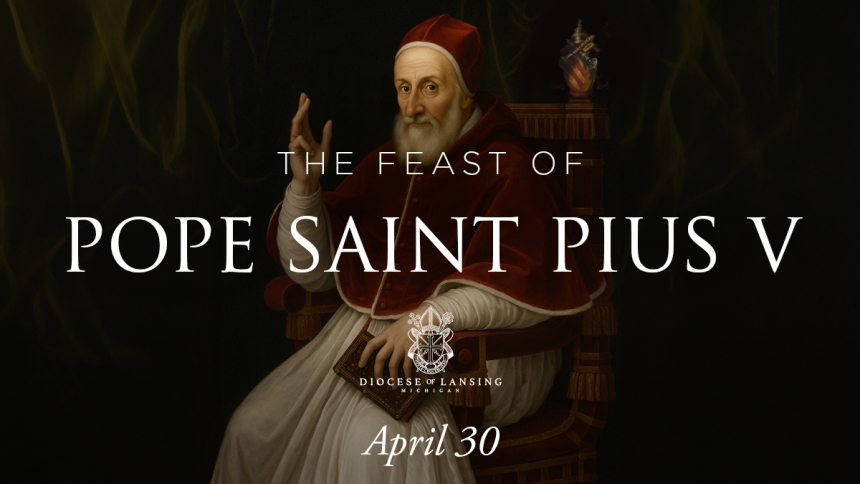
There are certain things you just shouldn’t do at Holy Mass. Today’s saint, Pope Saint Pius V (1504-1572), had no time for irreverence at Mass, writes Jeremy Priest, Director of the Office of Worship for the Diocese of Lansing, April 30. As the late Pope Francis has said, the most fundamental part of the Mass is that people have the sense that they are coming into the presence of God.
In the late tenth century, a delegation from the kingdom of Kievan Rus’ (modern day Belarus, Ukraine, and parts of Russia) ventured on a journey to find the true faith. Journeying from one territory to the next, they surveyed a host of peoples and witnessed the worship of many religions. After having returned from the solemn liturgy at the Hagia Sophia in Constantinople, they reported to their prince:
"Then we came to the edifices where they worship their God…we knew not whether we were in heaven or on earth. For on earth there is no splendor or such beauty, and we are at a loss how to describe it. We only know that God dwells there among men."
Dynamic, reverent, and beautiful worship is at the heart of the Church’s mission because union and communion with God is the source and summit of the Church’s life. Bishop Boyea recently commented on the fascinating fact that “the real obligation” at the heart of our Sunday obligation “is that we worship God.”
To worship God is to “acknowledge [the Lord] as God, as the Creator and Savior, the Lord and Master of everything that exists,” and so “to praise and exalt [God] and to humble oneself” in his presence (Catechism #s 2096, 2097). In this way, worship moves through words and actions of the body and culminates in an offering of ourselves and all that we have to Father, in union with the offering of Jesus, which draws all of reality into communion with God (cf. CCC 1368, 2031).
The worship that attracted the delegation from Kievan Rus’ was not directed at them. The remarkable thing about the story of the way the liturgy evangelized the “Rus” is that none of it was aimed at them. This loose federation of peoples didn’t even speak the language. Nevertheless, what they found in the beauty of the liturgy was worship that was focused on God. “What was impressive about” the worship they experienced, Pope Benedict wrote, “was particularly its sheer lack of a practical purpose, the fact that it was being done for God and not for spectators; it was simply striving to be…before God and for God alone (Rom 12:1; 15:16).”
Reverent worship is attuned to the God in whose presence He has gathered us. Accordingly, we kneel, bow, genuflect, stand, sing, speak, keep silence, and chant in ways that acknowledge the Lord who is present. Worship that is reverent draws us into the presence of the Holy One and incites us to awe and even the “fear of the Lord” in His presence (cf. Isaiah 11:2–3). Reverence is that attitude and sentiment with which the sacrifice of Abraham was made pleasing to the Lord (see Gen 22:12).
As we celebrate the memorial of Saint Pius V today, we remember one of his lasting achievements: the 1570 reform of the Missale Romanum (Roman Missal), the book of prayers and readings for celebrating Holy Mass. Living in a time torn by war and strife, both political and ecclesial, Pope Pius Pius V put first-things-first and put an end to things happening in the Mass that detracted from the worship of God, Father-Son-and-Holy Spirit. There is nothing more important than the worship of the All-Holy God God in the Sacred Liturgy.
Pope Saint Pius V, pray for us!
